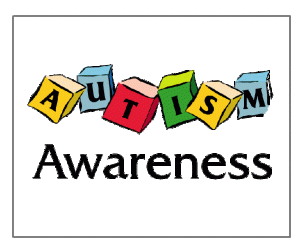From the Autism Society
 Today, bullying is a national epidemic causing significant concern for parents and caregivers. Approximately one in three kids are bullied in hallways, classrooms and during school related activities each year. Media reports show widespread examples of victimization suffered by kids of all ages and ability levels. More troubling – students living with autism spectrum disorder are 63 percent more likely to be recipients of bullying behavior than typically developing peers. All children, regardless of ability, deserve to learn in a safe and nurturing environment where positive relationships are cultivated. Kids have a right to feel cared for and protected in school.
Today, bullying is a national epidemic causing significant concern for parents and caregivers. Approximately one in three kids are bullied in hallways, classrooms and during school related activities each year. Media reports show widespread examples of victimization suffered by kids of all ages and ability levels. More troubling – students living with autism spectrum disorder are 63 percent more likely to be recipients of bullying behavior than typically developing peers. All children, regardless of ability, deserve to learn in a safe and nurturing environment where positive relationships are cultivated. Kids have a right to feel cared for and protected in school.
Adults are in no way immune to the problem. One in six has experienced bullying behavior in the workplace according to one report. Fear of income loss discourages individuals from reporting incidences or intervening on behalf of victims. With employment opportunities at a premium in the disability community, people with special needs are more susceptible to on the job bullying behavior with little to any recourse. Effects are far reaching; violence and intimidation cause harm to victims leaving support systems to cope with the aftermath.
Furthermore, increased social media, cell phone and email use continue to alter the bullying landscape. The National Crime Prevention Council reports 43 percent of teens have been cyberbullied by text messaging and social media. Incidents are now documented as they happen. Easy access to cell phones and social media platforms has resulted in viral video clips of horrific bullying incidents. The issue can no longer go ignored. No matter how benign the intent – it is the responsibility of every individual to reject bullying in all its forms.
The Autism Society is here to empower individuals on the spectrum, support providers and allies to take a stand against bullying. The 3 R’s for Bullying Prevention: Recognize, Respond and Report and Healing from Bullying for the individual with Autism Spectrum Disorder are two useful resources available to provide insight into the implications of bullying and its residual impact on victims. We are committed to promoting awareness and understanding about the dangers of bullying and helping all affected by autism to combat its existence once and for all.
To connect with the organization at the pulse of bullying research and prevention – PACER’s National Bullying Prevention Center – go to pacer.org/bullying. People in need of immediate support and healing from bullying behavior can call our Autism Source Contact Center at 1- 800-3-AUTISM or visit autismsource.org.
Related Online CEU Courses:
Bullying Prevention: Raising Strong Kids by Responding to Hurtful & Harmful Behavior is a 3-hour video-based continuing education (CE/CEU) course that teaches healthcare professionals how to handle and treat bullying behavior.
Electronic Media and Youth Violence is a 1-hour online CEU course that summarizes what is known about young people and electronic aggression, provides strategies for addressing the issue with young people, and discusses the implications for school staff, mental health professionals, parents and caregivers.
Building Resilience in your Young Client is a 3-hour online continuing education (CE/CEU) course that offers a wide variety of resilience interventions that can be used in therapy, school, and home settings.
—
Professional Development Resources is approved by the American Psychological Association (APA) to sponsor continuing education for psychologists. Professional Development Resources maintains responsibility for all programs and content. Professional Development Resources is also approved by the National Board of Certified Counselors (NBCC); the Association of Social Work Boards (ASWB); the American Occupational Therapy Association (AOTA); the American Speech-Language-Hearing Association (ASHA); the Commission on Dietetic Registration (CDR); the Alabama State Board of Occupational Therapy; the Florida Boards of Social Work, Mental Health Counseling and Marriage and Family Therapy, Psychology & School Psychology, Dietetics & Nutrition, Speech-Language Pathology and Audiology, and Occupational Therapy Practice; the Ohio Counselor, Social Worker & MFT Board and Board of Speech-Language Pathology and Audiology; the South Carolina Board of Professional Counselors & MFTs; and by the Texas Board of Examiners of Marriage & Family Therapists and State Board of Social Worker Examiners.



